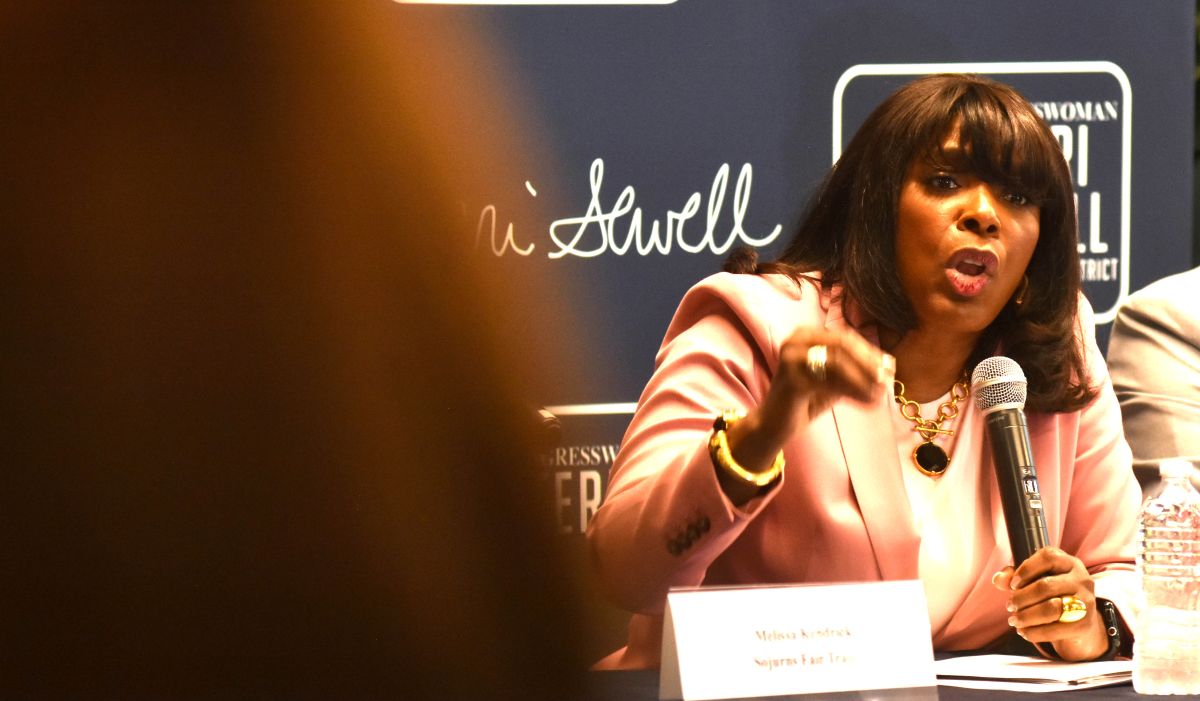Economy
‘It’s a gut punch,’ Panelist Says of Tariffs’ Effect on Small Businesses in Birmingham

Donate today to help Birmingham stay informed.
Melissa Kendrick, owner of Sojourns Fair Trade in Crestwood, said any small business can be staggered by changes to its operation and all of them have been socked in the jaw by tariffs.
“Paper shopping bags, plastic shopping bags, computers, receipt printers – all of those things are made overseas, so every business is already (affected by) tariffs,” Kendrick said. “Mine just happens to be 95% of my operations.”
Kendrick was among the panelists at U.S. Rep. Terri Sewell’s small business roundtable Tuesday at Birmingham’s Innovation Depot on the impact of tariffs ordered by the Trump administration.
“It’s hitting us in a big way, and for a small business, two or three bad months in a row can take us out,” Kendrick said. “Small businesses are always living on that line, so to suddenly have an extra 10% across the board laid on top of us, it’s a gut punch.”

Zebbie Carney of Eugene’s Hot Chicken said he has had to make changes to his operation to address the shifting tide brought about by tariffs. His company was going to launch a new marketing campaign but getting takeout containers became an issue.
Carney added that he’s had to increase the cost of some products and stop serving others where the cost challenged profitability.
“We just have to have more food truck mentality in our restaurants,” the restauranteur said. “We just have to go slimmer and go real lean. We have to just continue to look at costs every day.”
Another panelist was Patrick J. Murphy of the Collat School of Business at UAB and a scholar in residence at Innovation Depot. He said one of the greatest challenges for small businesses amid tariffs is uncertainty.
“The way to deal with fear is a strong entrepreneurial mindset and understanding that problems are what generate opportunities,” Murphy said. “It’s hard and there’s a pivot, but (successful) entrepreneurial firms, at the end of the day, are the ones that are nimble enough, generally speaking.
“It doesn’t happen like that. It happens over time, to do something in relation to change, a shock. A strong community is a big part of that.”
During the roundtable, entrepreneurs in the room were invited to stand. All eyes landed on 10-year-old Allison Dickerson, whose mother, Selena Rodgers-Dickerson, was on the panel.

The rising fifth grader at I3 Academy launched Alison’s Jiggly Gelato Ice Cream about a year ago. While the youngster said her operation hasn’t been impacted by tariffs, her mother’s company – SARCOR, LLC – has, even though she doesn’t produce a tangible product.
“My business is more service based,” Rodgers-Dickerson said. “I don’t have any products. Everything we do is in a computer. It’s engineering design services and so some things may not be built, but I wouldn’t say it’s tariff-based, per se.”
The panelist said her “product” is her employees, and she must factor in the ability of them to pay for their needs in pricing the services provided.
“I have to make sure that my employees can afford to live,” Rodgers-Dickerson said, “because their cost of living has gone up.”
Sewell said she convened her small business roundtable to emphasize the importance of small businesses as an economic engine in the economy.
“Sadly, as we gather today, our small businesses and supply chains they we rely upon are facing unprecedented uncertainty, thanks in part to the reckless and sweeping tariffs imposed by the Trump Administration.”
Sewell cited the 10% global tariffs imposed in April by President Trump on all American imports. She said there were additional “so called reciprocal tariffs” on certain countries.
“These tariffs amount to the largest increase, tax increase, in American history and they are taking a horrible toll on our nation’s small businesses,” the congresswoman said. “Without a doubt, small businesses are the strongest economic engine in this country and the backbone of our economy. To be clear, when tariffs are used strategically and in targeted ways, they are a tool in the toolbox to protect American jobs and industries. But this kind of sweeping, all-across-the-board approach is bad for consumers who have seen prices skyrocket.”


